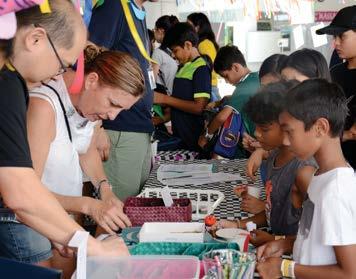43 | UWCSEA Annual Report 2018/2019
LEARNING PROGRAMME: PERSONAL AND SOCIAL EDUCATION The Personal and Social Education (PSE) programme helps to ensure that students feel secure and valued. In turn, this provides an effective base that encourages their learning, growth and social development. PSE underpins our entire programme, and is informed by both our mission and our Singapore context. It supports our international student community so that they feel truly valued by the adults who are leading their learning. The intent is so that they can continue to grow in self awareness, gaining an understanding of themselves and how they interact with those around them so as to develop effective and open-minded responses to personal and cultural differences. Time is dedicated each week for the intentional delivery of this important part of the student experience. However, student welfare is not limited to the allocated PSE time with their classroom teacher/mentor. Student welfare is also encompassed by safeguarding, learning support, wellness centre and counselling support, university advising, Heads of Grade and Vice Principals in supporting social and emotional needs of students. While all members of staff have a responsibility for the well-being of students, the learning support and wellness/counselling teams are central and work closely with teachers to ensure that students are supported both within and outside of the classroom. Broadly, the PSE curriculum content is classified in three overarching concepts: • individual wellbeing • relationships and community (interpersonal) wellbeing • student ability to engage with global issues (global wellbeing) During the 2018/2019 year, the rationale and standards for the PSE curriculum from K1 to Grade 12 were refined. As part of our PSE curriculum, these concepts are revisited each year with students, in a spiral structure which is designed to build on the understanding and skills of students at age-appropriate developmental levels.
STRATEGIC DEVELOPMENT: SAFEGUARDING At UWCSEA we define safeguarding as the proactive measures that we take to protect our students from maltreatment; to prevent impairment to their health and development; ensuring they are able to grow up with the provision of safe and effective care; and taking action to enable all children to have the best outcomes (Keeping Children Safe in Education, 2019). This creates the conditions that underpin the effective delivery of our PSE curriculum.
Safe Behaviours curriculum The 2018/2019 saw the development and integration of Safe Behaviours learning as part of the College’s PSE curriculum. As part of our PSE Strands on Personal Safety, Digital Safety, and Healthy Relationships, elements of the Keeping Safe: Child Protection Curriculum have been modified for our unique school and national context and added to our programme. This world-class, evidence-based child safety programme, developed by the South Australian Department of Education, is used by a number of international schools around the world. Adapted after careful review of available resources, it provides UWCSEA with a robust international benchmark for safeguarding learning.
Embedding policies and training During 2018/2019, the role of designated safeguarding leads was embedded across the College and all school sections. As a result, students were able to identify a number of adults who they were able to approach should they have a concern for themselves or another member of the community. ‘Who Can I Talk To’ communications (posters, web pages, notices etc) were highlighted to students, outlining a number of specially trained adults that students could approach in addition to their mentor/ classroom teacher. Across the College, the continued development of capacity in safeguarding and child protection included training identifying and responding to child protection concerns. The College also began implementation of systematic professional safeguarding training for safeguarding leads, school leadership, teaching and non-teaching staff, and began plans to extend this to volunteers following feedback.







